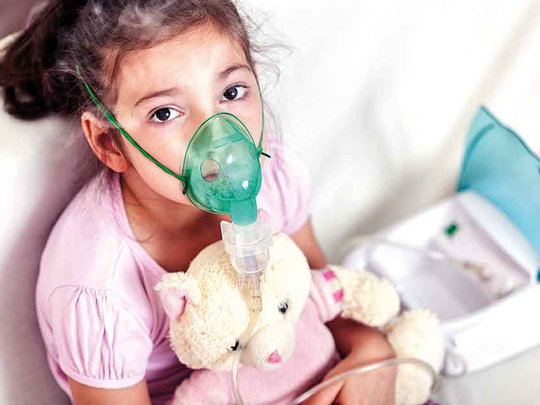
As winter approaches, the city sees a spike in the number of patients with upper respiratory infections (URTIs). URTI refers to infections affecting the ears, nose and throat such as tonsillitis, laryngitis and the common cold. It’s one of the most common forms of illness, particularly for children.
Dr Fatima Alzarooni, Consultant Paediatrician, Latifa Hospital, recognises this increase in the incidences of URTIs during winter but is unsure of the exact reason. “There is no real answer for the increase in cases during winter, but maybe people prefer to stay inside because of the cold weather outside,” she says. “When someone is infected and you are living with them, you are likely to catch an infection.” Dr Alzarooni also refers to how viruses thrive in the low-humidity conditions of winter as another possible cause.
The majority of URTIs are viral infections that can be combated by the body’s immune system, but some infections are bacterial and require treatment with antibiotics. “Different viruses have different symptom periods,” explains Dr Alzarooni. “Sometimes they last one to four or five days and sometimes they last for up to a week. Sometimes we cannot differentiate between viral and bacterial infections but conditions such as tonsillitis and pharyngitis, when caused by bacteria, result in high temperature and make people look sicker. Maybe they will be dehydrated and have large lymph nodes.”
Prevention is key
If you suspect your child is suffering from a URTI, you should seek professional advice. Yet, DHA’s policy is focused on preventing the occurrence of viruses. “What we recommend is that all kids get their vaccinations, such as the pneumonia vaccine and the annual influenza vaccine,” says Dr Alzarooni. “The influenza vaccine should be taken from the age of six months. It’s very important for stopping some of the common infections, such as URTI, which can lead to complications and hospitalisations, which we want to avoid.”
For the influenza virus, most are immunised at the end of October before winter starts, yet the vaccine is available at any time of year. Dr Alzarooni explains that it’s necessary to receive the immunisations annually as viruses evolve and mutate. “Viruses change their genetics so each year, it’s a different vaccine that fights certain viruses,” she says. “It is also very important to stay up to date on vaccinations if you are travelling to other parts of the world.”
Treating bacterial infection
Although the difference between the symptoms of a bacterial and viral infections can be difficult to diagnose, it’s important to seek treatment if you wish to avoid further complications. “If it’s a bacterial infection, such as bronchitis, and it’s left untreated it can lead to pneumonia,” says Dr Alzarooni. “Sometimes pneumonia requires treatment in a hospital with added intravenous fluids and antibiotics. If it’s a bacterial infection then we need to treat the patient with antibiotics.
“The body’s immune system usually works very well at fighting infections, unless the patient has underlying problems such as an immune deficiency or abnormalities of the lungs.”
If it is only a viral infection, then treatment may not be required, but making sure the child eats well and remains hydrated is important. “If your child has a virus then there shouldn’t be serious complications — it will just be symptomatic,” explains Dr Alzarooni. “But if the child with a virus isn’t eating or drinking well enough, then they will become dehydrated so we encourage them to increase their fluid intake and drink more.”
The common cold, rhinitis (blocked nose) and pharyngitis (swollen throat) are the most frequent infections caused by viruses such as influenza and coronavirus. While in most cases the treatment is supportive care, there are simple steps that can reduce the chance of infection. If your child is unwell, they should be kept at home to avoid infecting others. DHA is also keen to emphasise the importance of regularly washing hands with hot water and soap to avoid the spread of viruses and bacteria. The key message though is that of prevention. By ensuring your child’s immunisations are up-to-date, it will vastly improve their chances of avoiding upper respiratory tract infections.
New research points to an increased risk of asthma
Respiratory tract infections have been linked with an increased risk increase of contracting asthma, according to a report produced by the European Lung Foundation in September.
The study of 154,492 European children found that those with upper respiratory infections before the age of five were 1.5 times more likely to suffer from asthma in their later lives.
Conditions such as laryngitis and tonsillitis were linked with the lung condition although researchers were keen to stress that further research on children from birth was required before the results could be considered conclusive.
The study also found the likelihood of contracting asthma increased substantially for under-fives who suffered from lower respiratory tract infections such as bronchitis or pneumonia. In their cases, the chances of developing asthma rises from between two and four fold. However, scientists were keen to conduct deeper studies into whether those born with wheezing and poor lower lung function were predisposed to such infections or whether the disease asthma is the cause of the health issues.
Scientist also plan to study the impact of environmental factors, such as second-hand smoke and exposure to medicines such as antibiotics and their impact on the likelihood of children developing asthma as they mature.












